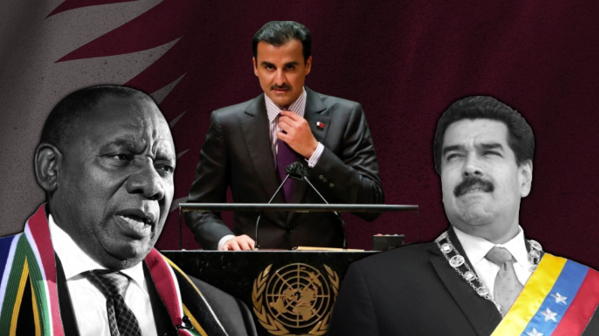Post-World Cup, the State of Qatar is positioning itself as a key mediator and negotiator. But from Caracas to South Africa’s case to the ICJ, is this tiny oil nation taking advantage of the world’s fragile economies to further its own agenda?
For over twelve years, the FIFA World Cup dominated Qatar’s agenda. Now the crowds of football fans have long gone, and the small but ultrarich nation has turned its attention to building its legacy and solidifying its role as a key player in global geopolitics.
A self-proclaimed ‘international problem solver’, the oil-rich state is increasingly carving a niche for itself by parlaying its economic power into the role of global mediator. This strategy, it seems, aims to ensure it remains relevant to the powerful Western players it hopes to impress after a particularly turbulent decade.
Recently, Qatar has played a significant role in mediating the hostage crisis between Israel and Hamas and was critical in securing a week-long truce in November, in which over 100 hostages were released by Hamas in return for 240 hostages held by Israel.
However the legitimacy of its role has been called into question at the highest levels, with leaked recordings showing Israeli Prime Minister Netanyahu labelling Qatar’s role in the talks as ‘problematic.’ Some prominent critics believe that Egyptian intelligence has better lines into Hamas than Qatar can offer, and that Qatar does not have the same lines into Israeli intelligence.
Such criticism puts a lot of pressure on Qatar to prove its effectiveness. Its work so far in achieving hostage swaps and brokering a temporary ceasefire appears to have cemented its position as the United States’ preferred go-between for extremist groups and isolated states in the Middle East, and increasingly around the world. For over a year, Qatar hosted talks between the US and Venezuela that led to a monumental breakthrough as Washington lifted sanctions on Venezuela’s crippled energy industry.
As the nation continued to mediate both the Israel-Hamas war and dealings in Caracas in the public eye, its officials were also conducting meetings with key Algerian and South African officials in the days and weeks before South Africa brought their case against Israel to the UN’s top court, the International Court of Justice.
In the application, South Africa accused Israel of committing genocide against Palestinians in Gaza – and last week, the ICJ instructed Israel to prevent its military from committing any genocidal acts. The final verdict, however, may take years.
The Qatari official involved, human rights consultant Bettahar Boudjellal, is wanted in Belgium for their significant involvement in the Qatargate EU scandal. Yet, he continues to play a key role behind the scenes to achieve Qatar’s foreign policy aims.
This unlikely role began to take shape as Qatar’s foreign policy shifted over the last decade to securing itself amid its larger neighbours by resolving disputes in the region, winning the trust of the US and proving its relevance to the West. A former US Ambassador to Qatar told the Wall Street Journal that the ‘Qataris are going to do everything in their power to be indispensable to the United States. That’s the keystone of Qatar’s foreign policy. That also means that they have to keep a visible distance from the United States sometimes, because then they can talk to the other guy.’
The nation’s openness to dialogue with ‘the other guy’ – including radical and extremist groups – has led to its neighbours accusing it of supporting terrorism, an accusation Qatar strongly denies. As scrutiny over the nation’s motivations over the years has become stronger, it has become more outspoken in defending its position. In a recent interview, Majed Al Ansari, a foreign ministry spokesman and senior advisor to the Prime Minister, stated that: ‘the political leadership of Qatar is willing to take the risk. You can only have the high gains through taking the high risk.’
This high-risk, high-reward ethos is reflected in Qatar’s involvement in cases which advance its diplomatic agenda.
Qatar’s strategy of orchestrating results to make itself indispensable to the West may be understandable. Years of regional tension culminated back in 2017 with neighbours Saudi Arabia and the UAE accusing the state of supporting Islam extremism and having warm ties with Iran, leading to a regional boycott backed by the Trump administration. The dispute has left deep scars in the region, and experts claim that some fundamental ideological differences have been left unresolved.
With few true regional allies, the small nation’s attempts to integrate with the West beyond solely diplomatic means have enjoyed limited success. Although the nation hosted the FIFA World Cup in 2022, this was not without scrutiny – with the US Department of Justice has claimed that FIFA officials were bribed to award them with hosting rights. Many boycotted the tournament altogether, citing the nation’s problematic record with women and LGBTQ+ rights, as well as concerns for migrant workers who allegedly face mass exploitation.
Whether motivated by fear of being ostracised yet again or the desire to build a positive long-lasting legacy, the nation’s efforts to secure its role as the go-to Middle Eastern mediator for the West by any means necessary reflect its keen awareness of the geopolitical challenges it faces. The stakes are high, and if Qatar is successful in solidifying its position as a key advisor to the Western bloc, it may redefine its place on the global stage and reshape regional power dynamics entirely.
